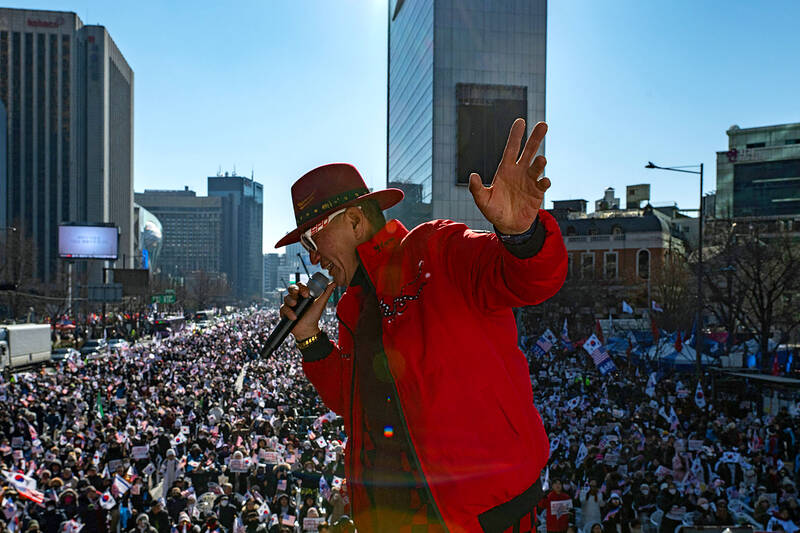Thousands of rival South Korean protesters rallied in the capital yesterday, a day after a failed attempt to arrest suspended South Korean President Yoon Suk-yeol for imposing a short-lived martial law decree that led to his impeachment.
The country has been plunged into political chaos since last month, with Yoon defiantly holed up in the presidential residence, surrounded by hundreds of loyal security officers who have so far resisted efforts by prosecutors to arrest him.
Thousands of protesters, both for and against Yoon, gathered in front of the residence and along major roads in Seoul yesterday — either demanding his arrest or calling for his impeachment to be declared invalid.

Photo: AFP
Supporter Kim Chul-hong, 60, said Yoon’s arrest could undermine South Korea’s security alliance with the US and Japan.
“Protecting President Yoon means safeguarding our country’s security against threats from North Korea,” he said.
Members of the Korean Confederation of Trade Unions, South Korea’s largest umbrella union, attempted to march to Yoon’s residence to protest against him, but were blocked by police. It said two of its members were arrested, and several others were injured in clashes.
Yoon faces criminal charges of insurrection, one of a few crimes not subject to presidential immunity, meaning he could be sentenced to prison or, at worst, the death penalty.
If the warrant is executed, Yoon would become the first sitting South Korean president to be arrested.
Investigators have asked South Korean Minister of Finance Choi Sang-mok, who was installed as acting president a week ago, to back the warrant by ordering the presidential security service to cooperate.
In scenes of high drama on Friday, Yoon’s guards and military troops shielded him from investigators who eventually called off the arrest attempt, citing safety concerns.
The showdown — which reportedly included shoving, but no shots fired — left the warrant in limbo, with the court order set to expire tomorrow.
The Corruption Investigation Office for High-ranking Officials could make another bid to arrest him before then.
However, if the warrant lapses, they may apply for another.
The South Korean Constitutional Court slated Jan. 14 for the start of Yoon’s impeachment trial, which if he does not attend would continue in his absence.
Former South Korean presidents Roh Moo-hyun and Park Geun-hye never appeared for their impeachment trials.
Yoon’s lawyers decried Friday’s arrest attempt as “unlawful and invalid,” and vowed to take legal action.
Experts said investigators could wait for greater legal justification before attempting to arrest the suspended president again.

Auckland rang in 2026 with a downtown fireworks display launched from New Zealand’s tallest structure, Sky Tower, making it the first major city to greet the new year at a celebration dampened by rain, while crowds in Taipei braved the elements to watch Taipei 101’s display. South Pacific countries are the first to bid farewell to 2025. Clocks struck midnight in Auckland, with a population of 1.7 million, 18 hours before the famous ball was to drop in New York’s Times Square. The five-minute display involved 3,500 fireworks launched from the 240m Sky Tower. Smaller community events were canceled across New Zealand’s

The Ministry of Foreign Affairs (MOFA) yesterday said it is closely monitoring developments in Venezuela, and would continue to cooperate with democratic allies and work together for regional and global security, stability, and prosperity. The remarks came after the US on Saturday launched a series of airstrikes in Venezuela and kidnapped Venezuelan President Nicolas Maduro, who was later flown to New York along with his wife. The pair face US charges related to drug trafficking and alleged cooperation with gangs designated as terrorist organizations. Maduro has denied the allegations. The ministry said that it is closely monitoring the political and economic situation

UNRELENTING: China attempted cyberattacks on Taiwan’s critical infrastructure 2.63 million times per day last year, up from 1.23 million in 2023, the NSB said China’s cyberarmy has long engaged in cyberattacks against Taiwan’s critical infrastructure, employing diverse and evolving tactics, the National Security Bureau (NSB) said yesterday, adding that cyberattacks on critical energy infrastructure last year increased 10-fold compared with the previous year. The NSB yesterday released a report titled Analysis on China’s Cyber Threats to Taiwan’s Critical Infrastructure in 2025, outlining the number of cyberattacks, major tactics and hacker groups. Taiwan’s national intelligence community identified a large number of cybersecurity incidents last year, the bureau said in a statement. China’s cyberarmy last year launched an average of 2.63 million intrusion attempts per day targeting Taiwan’s critical

‘SLICING METHOD’: In the event of a blockade, the China Coast Guard would intercept Taiwanese ships while its navy would seek to deter foreign intervention China’s military drills around Taiwan this week signaled potential strategies to cut the nation off from energy supplies and foreign military assistance, a US think tank report said. The Chinese People’s Liberation Army (PLA) conducted what it called “Justice Mission 2025” exercises from Monday to Tuesday in five maritime zones and airspace around Taiwan, calling them a warning to “Taiwanese independence” forces. In a report released on Wednesday, the Institute for the Study of War said the exercises effectively simulated blocking shipping routes to major port cities, including Kaohsiung, Keelung and Hualien. Taiwan would be highly vulnerable under such a blockade, because it